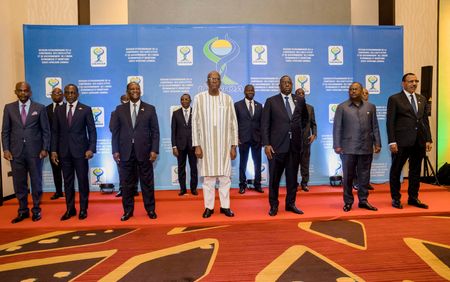By Christian Akorlie and Tiemoko Diallo
ACCRA (Reuters) – West African nations will close their borders with Mali, sever diplomatic ties and impose tough economic sanctions in response to its “unacceptable” delay in holding elections following a 2020 military coup, the 15-state regional bloc said on Sunday.
The fresh measures from the Economic Community of West African States (ECOWAS) represent a significant hardening of its stance towards Mali, whose interim authorities have proposed https://www.reuters.com/world/africa/mali-proposes-five-year-election-delay-west-african-bloc-2022-01-01 holding elections in December 2025 instead of this February as originally agreed with the bloc.
In a communique issued after an emergency summit in the Ghanaian capital Accra, ECOWAS said it found the proposed timetable for a transition back to constitutional rule totally unacceptable.
This schedule “simply means that an illegitimate military transition government will take the Malian people hostage”, ECOWAS added.
The organisation said it had agreed to impose additional sanctions with immediate effect. These included the closure of members’ land and air borders with Mali, the suspension of non-essential financial transactions, the freezing of Malian state assets in ECOWAS commercial banks and recalling their ambassadors from Bamako.
Meanwhile, regional monetary union UEMOA instructed all financial institutions under its umbrella to suspend Mali with immediate effect, severing the country’s access to regional financial markets.
The Malian interim government said it was astonished by the decisions. In response, it vowed to close its side of the border with ECOWAS member states, recall its ambassadors, and reserve the right to reconsider its membership in ECOWAS and UEMOA.
“The government strongly condemns these illegal and illegitimate sanctions,” it said in a statement read on state television by spokesperson Abdoulaye Maiga in the early hours of Monday, calling on Malians to remain calm.
They have previously blamed the election delay partly on the challenge of organising a democratically robust vote amid a violent Islamist insurgency.
TOUGHER RESPONSE
Special forces commander Assimi Goita was one of several colonels who overthrew Malian President Boubacar Ibrahim Keita in August 2020, after which the interim authorities promised an 18-month transition to civilian rule.
Goita staged a second coup in May 2021 when he pushed aside the interim president and took the job himself.
The tougher response from ECOWAS reflects the pressure the organisation is under to show it can protect democracy from a backslide to military rule after West and Central Africa saw four coups within 18 months.
The new measures will be gradually lifted only after an acceptable election timeframe is finalised and progress is made towards implementing it, ECOWAS said.
Under previous sanctions, Mali’s ECOWAS membership is suspended and members of the transitional authority and their relatives are subject to travel bans and asset freezes.
Immediately after Keita was ousted, ECOWAS temporarily closed its borders with Mali and halted financial flows – short-term sanctions that caused a sharp fall in imports to the landlocked country.
Mali’s political upheaval has also deepened tensions with former colonial power France, which has thousands of soldiers deployed across West Africa’s Sahel region to battle Islamist insurgents.
(Additional reporting by Ange Aboa; Writing by Alessandra Prentice; Editing by Raissa Kasolowsky, Frances Kerry and Pravin Char)









